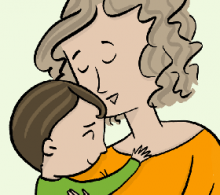Parenting After Separation and Parenting After Separation for Indigenous Families are free online courses that:
- explain how separation can affect both parents and children,
- will give you some ideas about how to:
- talk to your spouse and your children,
- co-parent, and
- solve parenting problems, and
- will give you information about:
- family law,
- reaching agreements, and
- going to court.
Each course takes about 3 or 4 hours. They’re available in English only. You can either watch videos of them or read the information on the website.
Who has to take a Parenting After Separation course?
Depending on which type of registry you're in, you might have to do a Parenting Education Program, such as Parenting After Separation, before you can go to court.
It's a good idea to do a Parenting After Separation course even if you aren't in a registry where you have to do one. Grandparents, aunts, uncles, and other special people in a child's life can also find them very helpful.
You might not have to do a Parenting After Separation course. You're exempt from attending (you don't have to attend) if:
- you completed one within 2 years before the date of your family management conference,
- you aren't fluent in English,
- you don't have access to the Internet to take the online course,
- you can't attend because you have serious health problems,
- you're only dealing with spousal support,
- the children are all over 19, or
- a consent order covering all the issues about the children has been filed.
You might also be allowed to miss the Parenting After Separation course if there's an emergency in your family.
If you think you might be exempt, ask the court registry for a Notice of Exemption from Parenting Education Program form (Form 20). Fill in that form and file it instead of a certificate of completion.
What if you feel you or your children are in danger?
If:
- you need to do a Parenting After Separation course, but
- you feel your and your children's safety is at risk, and
- you want a protection order,
you can delay doing the course until you've asked for the protection order.
If:
- you need to do a Parenting After Separation course, and
- you're asking the court for a order about an priority parenting matter,
you can delay doing the course until that matter is heard by the court.
- important time-sensitive or emergency medical treatment for a child
- one of you applying for an item like a passport, licence, permit, or benefit that's important to the child's safety or well-being
- a child's upcoming travel or activity
- a time-sensitive change of where the child lives that would affect their relationship with the other guardian, or
- a child's removal from or return to a specific area in BC.
Parenting After Separation and Provincial Court
After you've done the course, you'll get a certificate of completion to prove that you did it.
If you're in a registry where you have to do a Parenting After Separation course, you and your spouse must have your certificate of completion before you can:
- file an Application About a Family Law Matter (Form 3),
- file a Reply to an Application About a Family Law Matter (Form 6), or
- attend a family management conference (FMC) in Provincial Court.
Depending on which registry you're using, you might also have to meet with a family justice counsellor for a needs assessment. See Family justice counsellors to find out more.
Try to think about how things will be, not how they were, should be, or could've been.
Tess explains the legal meaning of "best interests of the child" in our story Putting children first.

